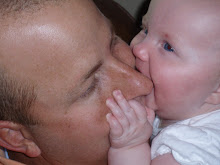As for C&P, in Part Four, hopefully you noticed the reoccurrence of Lazarus in the discussion between Raskolnikov and Porfiry. Whether you looked back to see who Lazarus was back in Part 3, take note of its significance here and begin to put some of the clues together based on Sonya's reading of the story of Lazarus and how it could possibly symbolize Raskolnikov.
At the conclusion of Part Four, everything seems to be going perfectly for Raskolnikov; his sister appears to have broken off her engagment to Luzhin, Nikolai has confessed to the murder of the pawnbroker, and Sonya even appears to be falling for him (despite his callous treatment of her near the end of the fourth section). What more could he ask for? Alas, there are still two more parts to go ... whatever could go wrong? Hmm.
Anyway, here are some guiding questions from this Part that intrigued me, perhaps they will interest you too:
1) What is the best thing for Dunya to do? Follow her brother's directive, forgive Luzhin, reconnect with Svidrigailov, or continue flirting with Razumikhin? Why? And what exactly is her role in the novel? Why is she important?
2) Why does Sonya continue to show affection for Raskolnikov after their meeting in the fourth section? He basically spends the whole time antagonizing her, reliving past horrors for her, and even tells her, "But maybe there isn't a God!" (321), a statement that he knew would incite rage in her after she just told him of her beliefs in God. So why does she continue to support him instead of tossing him out the door?
3) What is Porfiry's motive in bringing Raskolnikov in and basically laying out his entire case for Raskolnikov. He basically comes out and says he knows Raskolnikov did it. Why would he do this? What are his intentions and why does he think this is the best route?


4 comments:
2) I feel that Sonya can see the good in all people. She strongly believes in God's power to save ones who are truly repentant and thinks that Raskolnikov fits into that category. She supports him because she can also tell he is unhappy and she is concerned why he is so upset. She also has so much faith in God that his comments don't really disturb her faith they make her want to help him have faith too. That's just my opinion but what do I know? Haha I've only got 40 pages left!
Waller! Woo Hoo, a new post person. Yea!
I like what you're saying. I guess my follow-up question is do you believe she has the ability to see the good in ALL people, or just Rodya? I'm not sure of the answer, just curious as to why you see it as being on a larger scale.
In addition, I'd love to hear more on what you think is the cause of his unhappiness. It's not the murder, what is it?
Thanks for coming online and giving your thoughts. I do appreciate it.
I didn't know where else to pose this question,, I guess I could have emailed you but maybe other ppl have the same question to so yeah it's about number 1 on the writing assignment..
I guess I took this differently than some other people and is there really like only one answer?? Because I chose to relate it to the Victorian time period and justified my answer by the actual conflicts conveyed in his book, the murder and how it shows the individual vs mankind yada yada.. or would you rather hear about the world events of the time period and how literature such as Dostoevsky's reflected these changing times?? Does it even matter?? hahaha
Good question anonymous ... hopefully you'll see this before Tuesday. A simple search on google gave me this response:
It was the twin giants Leo Tolstoy and Fyodor Dostoyevsky whose work exploded out of Russia in the 1870s to overwhelm Europeans with their imaginative and emotional power. To many readers it must have seemed as if this distant, obscure country had suddenly leaped to the forefront of contemporary letters. Both were profoundly influenced both by European Romanticism and Realism, but their fiction offered characters more complex and impassioned than those Europeans were used to."
That would seem a good place to start exploring and learn more about European Romanticism and Realism.
Some people have said they thought it was more Victorian. That's fine. I'm not so much caught up in what you label it, as to how you say the book fits into whatever category you choose. (i.e. do you understand what that time period is and how it relates or are you just putting something down.)
Hope that helps.
Post a Comment